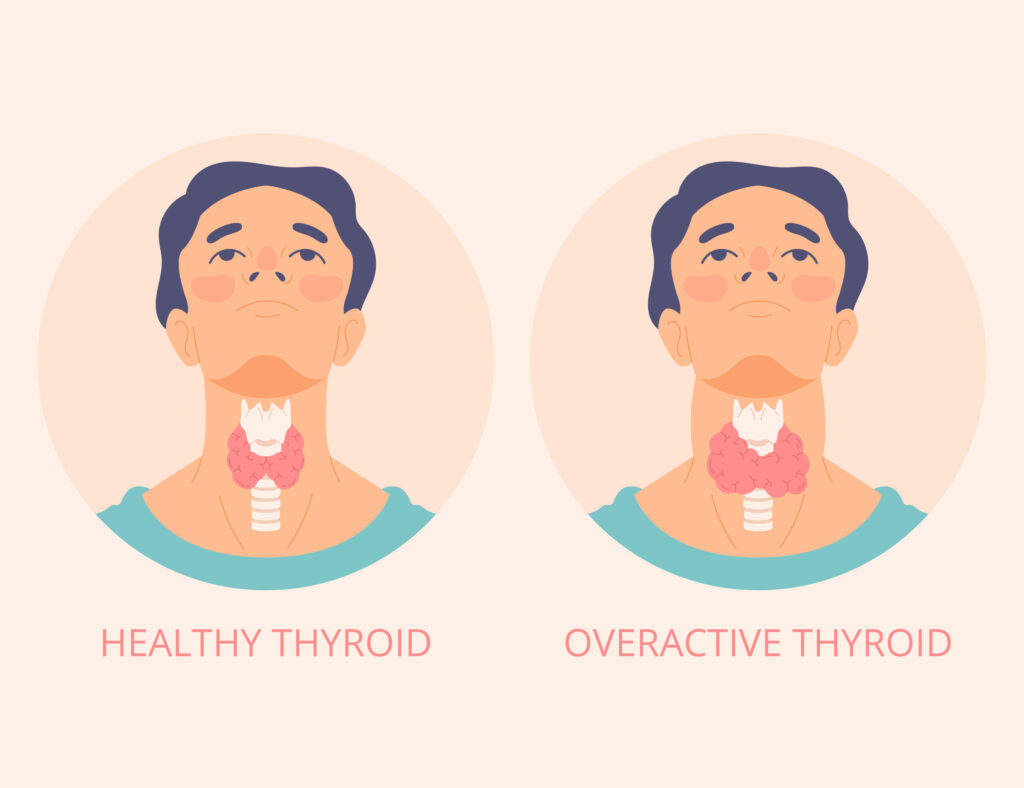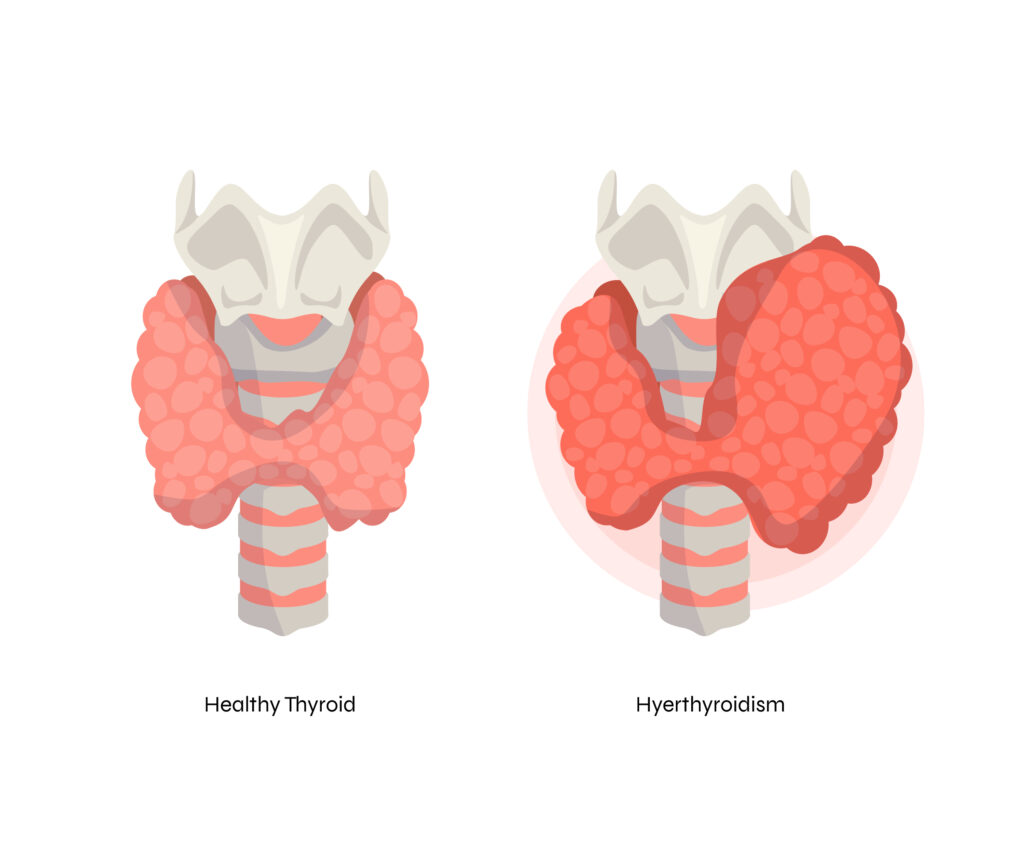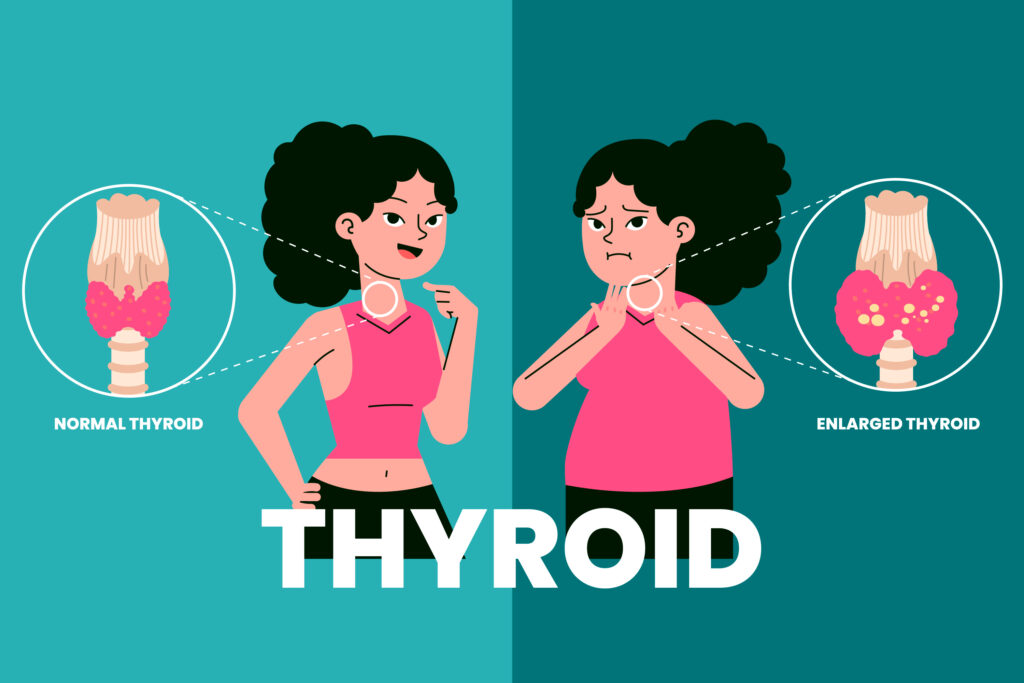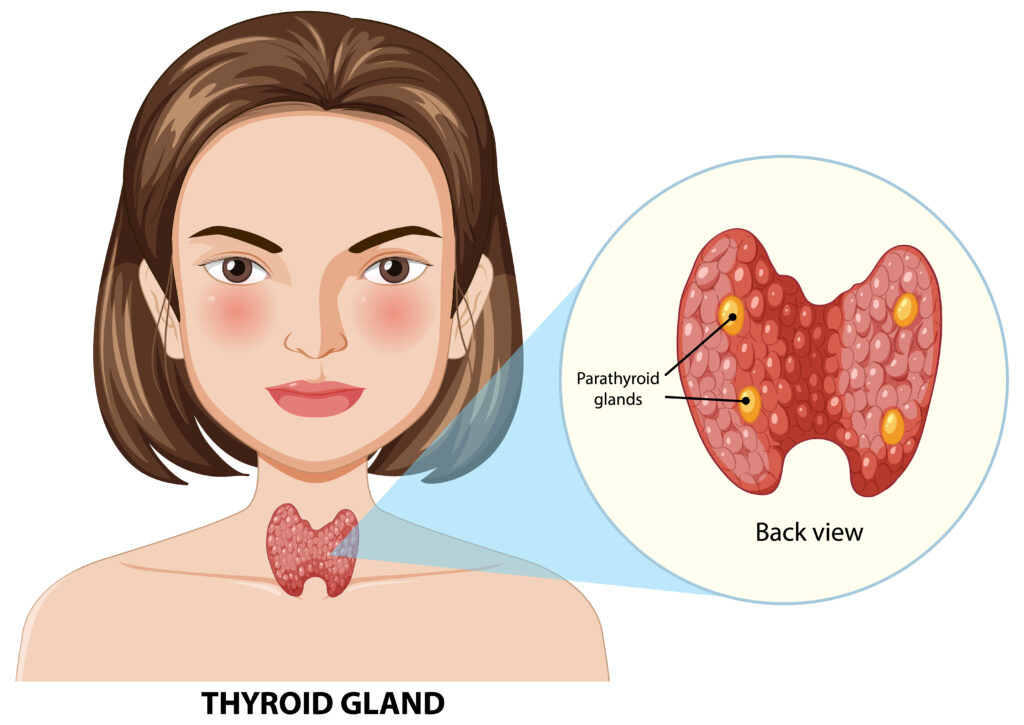
Thyroid disorders, particularly hypothyroidism, can make weight management a challenging journey for many individuals. The thyroid gland plays a crucial role in regulating metabolism, and when it underperforms, as in hypothyroidism, the body’s metabolic rate slows down, leading to weight gain and difficulty losing weight. Many people with hypothyroidism struggle with stubborn weight, fatigue, and other symptoms that make weight loss seem nearly impossible.
However, with the right treatment, diet, and lifestyle changes, it is still possible to lose weight, even with a sluggish thyroid. In this article, we’ll explore the connection between hypothyroidism and weight gain and provide tips on how to successfully manage your weight while living with this condition.
Understanding Hypothyroidism

Hypothyroidism, also known as an underactive thyroid, is a common endocrine disorder that occurs when the thyroid gland does not produce enough thyroid hormones. This condition can significantly impact various bodily functions, including metabolism, energy levels, and overall health. The thyroid gland, located in the front of the neck, plays a crucial role in regulating metabolism by releasing hormones such as thyroxine (T4) and triiodothyronine (T3). When the thyroid is underactive, it can lead to a wide range of symptoms and health complications, including weight gain, fatigue, and depression.
Causes and Risk Factors
Several factors can contribute to the development of hypothyroidism. The most common cause is Hashimoto’s thyroiditis, an autoimmune condition in which the body’s immune system mistakenly attacks the thyroid gland, leading to decreased hormone production. Other potential causes include:
- Radiation Therapy: Treatment for head and neck cancers can damage the thyroid gland.
- Thyroid Surgery: Removal of the thyroid or part of it can result in insufficient hormone production.
- Medications: Certain medications, such as lithium or those used to treat hyperthyroidism, can affect thyroid function.
- Iodine Deficiency: Iodine is essential for thyroid hormone production; inadequate iodine intake can lead to hypothyroidism.
Additionally, certain populations are at higher risk, including women, especially those over the age of 60, and individuals with a family history of thyroid disorders.
Common Symptoms of Hypothyroidism
Recognizing the symptoms of hypothyroidism is crucial for early diagnosis and management. Common symptoms include:
- Fatigue: Persistent tiredness and lack of energy are hallmark signs.
- Weight Gain: Difficulty losing weight or unexplained weight gain, even with diet and exercise.
- Cold Intolerance: Increased sensitivity to cold temperatures.
- Dry Skin and Hair: Skin may become dry and flaky, and hair can become brittle or thin.
- Constipation: Slower digestive processes may lead to constipation.
- Depression: Changes in mood and cognitive function can occur, leading to feelings of sadness or depression.
- Menstrual Irregularities: Women may experience changes in their menstrual cycle, including heavier or irregular periods.
If left untreated, hypothyroidism can lead to more severe health issues, including heart problems, infertility, and myxedema coma, a rare but life-threatening condition.
Understanding hypothyroidism and its symptoms is the first step toward effective management. If you suspect you have an underactive thyroid or are experiencing any of the symptoms mentioned, it is essential to consult a healthcare professional for proper testing and diagnosis. Early intervention can help restore hormone levels, improve overall health, and support weight management efforts, allowing you to live a healthier, more balanced life.
The Role of Thyroid Hormones in Metabolism
Thyroid hormones, primarily thyroxine (T4) and triiodothyronine (T3), play a vital role in regulating metabolism, which encompasses the biochemical processes that convert food into energy. These hormones are produced by the thyroid gland, a butterfly-shaped gland located in the front of the neck. The proper functioning of the thyroid is crucial for maintaining overall health, as thyroid hormones influence nearly every organ system in the body.
1. Regulating Metabolic Rate
Thyroid hormones are essential for determining the body’s basal metabolic rate (BMR), which is the rate at which the body expends energy at rest. T3, the more active form of thyroid hormone, directly influences the metabolic processes in cells. It increases the rate of cellular respiration, promoting energy production and heat generation. Higher levels of thyroid hormones typically lead to an increased metabolic rate, which can facilitate weight loss, while lower levels can result in a sluggish metabolism and difficulty losing weight.
2. Impact on Macronutrient Metabolism
Thyroid hormones also play a critical role in the metabolism of carbohydrates, proteins, and fats:
- Carbohydrates: T3 stimulates gluconeogenesis (the production of glucose from non-carbohydrate sources) and enhances the absorption of glucose from the intestines. This helps maintain stable blood sugar levels and provides energy for cellular functions.
- Proteins: Thyroid hormones are involved in protein synthesis and degradation. They promote the uptake of amino acids into cells, supporting muscle growth and repair. A deficiency in thyroid hormones can lead to muscle wasting and increased protein breakdown.
- Fats: Thyroid hormones facilitate the mobilization of stored fats for energy use. They enhance lipolysis, the breakdown of fat cells, and help regulate cholesterol levels in the blood. Low levels of thyroid hormones can result in increased fat accumulation and difficulty in losing weight.
3. Influencing Other Hormonal Interactions
Thyroid hormones interact with other hormones that are crucial for metabolism. For instance, they work in tandem with insulin, a hormone responsible for regulating blood sugar levels. Proper thyroid function ensures that insulin works effectively, allowing the body to utilize glucose efficiently. Additionally, thyroid hormones can influence the levels of cortisol, the stress hormone, which plays a role in fat metabolism and appetite regulation.
4. Effects of Hypothyroidism on Metabolism
In individuals with hypothyroidism, the insufficient production of thyroid hormones leads to a decreased metabolic rate. This can result in various symptoms, including:
- Weight gain or difficulty losing weight
- Fatigue and low energy levels
- Cold intolerance
- Dry skin and hair changes
Understanding the role of thyroid hormones in metabolism is crucial for managing weight and overall health. If you suspect you have a thyroid disorder, consulting with a healthcare professional can lead to proper testing, diagnosis, and treatment, helping to restore metabolic balance and support your weight loss journey.
Weight Loss Challenges with Hypothyroidism

Hypothyroidism, characterized by an underactive thyroid gland, presents unique challenges for individuals trying to lose weight. The hormonal imbalances associated with this condition can significantly impact metabolism, energy levels, and overall body composition, making weight management more difficult. Understanding these challenges is essential for developing effective strategies to overcome them and achieve weight loss goals.
1. Slowed Metabolism
One of the primary challenges of hypothyroidism is a slowed metabolism due to decreased levels of thyroid hormones, particularly T3. When the thyroid produces insufficient hormones, the body’s basal metabolic rate (BMR)—the rate at which it expends energy at rest—drops significantly. This means that individuals with hypothyroidism burn fewer calories throughout the day, making it more challenging to create the calorie deficit necessary for weight loss. As a result, even with a reduced calorie intake, those with hypothyroidism may find it difficult to lose weight.
2. Increased Fat Storage
Hypothyroidism can lead to changes in how the body processes and stores fat. When thyroid hormone levels are low, the body tends to store fat rather than burn it for energy. This can result in an increase in body fat percentage, particularly around the abdomen. Additionally, the lack of thyroid hormones can impact insulin sensitivity, leading to higher levels of insulin in the bloodstream. Elevated insulin levels promote fat storage and can hinder weight loss efforts, further complicating the weight management process.
3. Fatigue and Low Energy Levels
Individuals with hypothyroidism often experience fatigue, lethargy, and reduced energy levels. This can make it challenging to maintain a regular exercise routine, which is essential for effective weight loss. The lack of motivation and energy can lead to a more sedentary lifestyle, contributing to weight gain or making it harder to lose existing weight. Moreover, feeling fatigued can impact mental well-being, leading to emotional eating or unhealthy food choices, which further complicates weight management.
4. Fluid Retention and Bloating
Hypothyroidism can cause fluid retention, leading to bloating and puffiness, particularly in the face and extremities. This can create the illusion of weight gain, even if fat loss is occurring. The retained fluid can mask progress on the scale, leading to frustration and discouragement. Understanding that fluctuations in weight can be influenced by water retention can help individuals stay focused on their long-term weight loss goals rather than short-term changes.
5. Hormonal Imbalances and Cravings
Hypothyroidism can also lead to hormonal imbalances that may contribute to increased appetite and food cravings. For instance, changes in leptin and ghrelin levels—hormones that regulate hunger and satiety—can occur in individuals with hypothyroidism. This disruption may lead to increased feelings of hunger and difficulty recognizing when one is full, making it challenging to adhere to a calorie-restricted diet.
Strategies for Overcoming Weight Loss Challenges
While hypothyroidism presents unique challenges to weight loss, several strategies can help individuals manage their condition and achieve their weight loss goals:
- Consult a Healthcare Professional: Regular monitoring of thyroid hormone levels and medication adjustments can help regulate metabolism.
- Focus on Nutrition: Adopting a balanced, nutrient-dense diet rich in whole foods can support thyroid function and overall health. Foods high in fiber can also help manage appetite.
- Incorporate Regular Exercise: Engaging in both aerobic and strength-training exercises can help boost metabolism and improve energy levels.
- Manage Stress: Stress management techniques, such as mindfulness, yoga, or meditation, can help regulate cortisol levels and improve overall well-being.
- Stay Hydrated: Drinking plenty of water can help alleviate fluid retention and support overall metabolic processes.
By understanding the specific challenges of weight loss with hypothyroidism and implementing effective strategies, individuals can work towards achieving their weight loss goals and improving their overall health.
Dietary Considerations for Managing Hypothyroidism
Managing hypothyroidism effectively requires a comprehensive approach, and diet plays a crucial role in supporting thyroid function and overall health. While medication is often necessary for regulating hormone levels, the right dietary choices can complement treatment, enhance energy levels, and promote weight management. Here are some key dietary considerations for individuals with hypothyroidism:
1. Incorporate Iodine-Rich Foods
Iodine is an essential nutrient for the production of thyroid hormones. Including iodine-rich foods in your diet can help support thyroid health. Good sources of iodine include:
- Seafood: Fish (especially sea fish), shellfish, and seaweed.
- Dairy Products: Milk, yogurt, and cheese.
- Eggs: Particularly the yolk.
However, it’s important to note that excessive iodine intake can also be harmful, especially for those with autoimmune thyroid conditions. It’s best to consult with a healthcare professional before making significant dietary changes.
2. Focus on Selenium and Zinc
Selenium and zinc are vital minerals that play a role in thyroid hormone metabolism and overall thyroid function. Foods rich in these nutrients include:
- Selenium: Brazil nuts, sunflower seeds, fish (like tuna and sardines), and eggs.
- Zinc: Oysters, beef, pumpkin seeds, lentils, and chickpeas.
Incorporating these foods into your diet can help support thyroid health and potentially improve hormone levels.
3. Eat a Balanced, Nutrient-Dense Diet
A balanced diet that includes a variety of fruits, vegetables, whole grains, lean proteins, and healthy fats is essential for overall health and well-being. Foods high in antioxidants, such as berries, leafy greens, and colorful vegetables, can help combat oxidative stress and inflammation, which are often associated with thyroid disorders.
Additionally, whole grains like quinoa, brown rice, and oats can provide essential nutrients and fiber, supporting digestive health and helping to maintain steady energy levels.
4. Limit Goitrogens in Moderation
Goitrogens are substances that can interfere with thyroid hormone production by inhibiting the uptake of iodine. Some foods contain goitrogens, including:
- Cruciferous Vegetables: Broccoli, cauliflower, kale, and Brussels sprouts.
- Soy Products: Tofu, tempeh, and soy milk.
While it’s not necessary to eliminate these foods completely, it’s advisable to consume them in moderation and cook them, as cooking can reduce their goitrogenic effects.
5. Monitor Gluten Intake
Some individuals with hypothyroidism, particularly those with autoimmune thyroid conditions like Hashimoto’s thyroiditis, may benefit from a gluten-free diet. Research has shown a link between gluten sensitivity and thyroid disorders, so reducing gluten-containing foods (like wheat, barley, and rye) may help alleviate symptoms and improve thyroid function for some people.
6. Stay Hydrated
Adequate hydration is essential for overall health and can help manage symptoms associated with hypothyroidism, such as fatigue and constipation. Aim to drink plenty of water throughout the day and consider incorporating herbal teas and other hydrating beverages to meet your fluid needs.
7. Limit Processed Foods and Sugars
Processed foods often contain unhealthy fats, sugars, and additives that can contribute to inflammation and weight gain. Reducing the intake of sugary snacks, refined carbohydrates, and processed foods can help support metabolic health and weight management. Instead, opt for whole, minimally processed foods that nourish your body.
The Impact of Exercise on Weight Loss with Hypothyroidism
Managing weight loss with hypothyroidism can be particularly challenging due to hormonal imbalances that affect metabolism. However, exercise plays a crucial role in supporting weight loss efforts and improving overall health in individuals with this condition. While it may require more effort, incorporating regular physical activity can yield significant benefits, including enhanced metabolism, improved mood, and better energy levels.
1. Boosting Metabolism and Energy Levels
Exercise is a powerful tool for boosting metabolism, even in individuals with hypothyroidism. Regular physical activity increases the basal metabolic rate (BMR), helping the body burn more calories at rest. Engaging in aerobic exercises, such as walking, running, cycling, or swimming, can significantly contribute to calorie expenditure and fat loss. Additionally, strength training—such as weightlifting—builds lean muscle mass, which can further elevate metabolism, as muscle tissue burns more calories than fat tissue even when at rest.
In individuals with hypothyroidism, incorporating regular exercise can also help combat fatigue, a common symptom of the condition. As energy levels improve, individuals may find it easier to engage in physical activity, creating a positive feedback loop that supports weight loss efforts.
2. Improving Insulin Sensitivity
Hypothyroidism can lead to insulin resistance, which can make it more difficult to lose weight. Exercise is known to improve insulin sensitivity, allowing cells to use glucose more effectively. This is particularly beneficial for individuals with hypothyroidism, as improved insulin sensitivity can help stabilize blood sugar levels and reduce fat storage. Incorporating both aerobic and resistance training into a regular exercise routine can have a synergistic effect on insulin sensitivity and overall metabolic health.
3. Enhancing Mood and Reducing Stress
Weight management is not solely a physical challenge; it also involves psychological factors. Individuals with hypothyroidism often experience mood fluctuations, anxiety, and depression, which can affect motivation to exercise and adhere to a weight loss plan. Regular exercise is known to release endorphins, the body’s natural mood lifters, which can help alleviate feelings of stress and anxiety. This positive impact on mental health can lead to improved motivation and adherence to exercise routines, making it easier to stay on track with weight loss goals.
Moreover, engaging in physical activities can serve as a healthy coping mechanism for stress, reducing the likelihood of emotional eating—another common challenge for individuals with hypothyroidism.
4. Creating a Sustainable Routine
Finding a sustainable exercise routine is essential for long-term success in weight management. Individuals with hypothyroidism should focus on finding activities they enjoy, as this will increase the likelihood of sticking to the routine. Whether it’s group classes, hiking, swimming, or home workouts, the key is to create a balanced regimen that incorporates aerobic, strength, and flexibility exercises.
Additionally, individuals should listen to their bodies and allow for adequate rest and recovery. Given that fatigue is a common symptom of hypothyroidism, pacing workouts and including low-intensity exercises like yoga or walking can be beneficial. Consistency is more important than intensity, so establishing a routine that feels manageable is crucial.
Medication and Treatment Options

Hypothyroidism is a condition characterized by an underactive thyroid gland that fails to produce sufficient amounts of thyroid hormones. Proper treatment is crucial to managing symptoms, maintaining metabolic balance, and supporting weight loss efforts. Here are the primary medication and treatment options available for individuals with hypothyroidism.
1. Levothyroxine (T4) Therapy
The most common and effective treatment for hypothyroidism is levothyroxine, a synthetic form of the thyroid hormone thyroxine (T4). This medication helps to restore normal hormone levels, alleviating symptoms and improving overall metabolic function.
- Dosage and Monitoring: Levothyroxine dosage is individualized based on factors such as age, weight, severity of hypothyroidism, and individual response. Regular monitoring of thyroid-stimulating hormone (TSH) levels is essential to ensure that the dosage is appropriate, with adjustments made as needed.
- Administration: Levothyroxine is typically taken orally on an empty stomach, usually in the morning. It is important to maintain consistency in the timing of the dose and avoid taking certain supplements (like calcium or iron) within a few hours of the medication, as these can interfere with absorption.
2. Combination Therapy
In some cases, healthcare providers may prescribe a combination of levothyroxine (T4) and liothyronine (T3), another form of thyroid hormone. This approach aims to provide a more balanced hormone replacement for individuals who do not feel fully symptomatic relief with T4 alone.
- Potential Benefits: Combination therapy may be beneficial for those experiencing persistent symptoms such as fatigue, weight gain, and mood disturbances despite adequate T4 levels. However, this approach is less common and should be considered on a case-by-case basis.
3. Regular Monitoring and Adjustments
Managing hypothyroidism is an ongoing process that requires regular follow-up with healthcare providers. TSH levels should be monitored at least annually or more frequently after starting or adjusting medication. Symptoms, side effects, and overall health should also be evaluated during these appointments to ensure that the treatment plan remains effective.
4. Lifestyle Modifications
While medication is the cornerstone of hypothyroidism treatment, lifestyle modifications can play a supportive role in managing the condition.
- Dietary Changes: As discussed previously, a nutrient-dense diet that includes iodine, selenium, and zinc can support thyroid function. Reducing goitrogenic foods may also be beneficial for some individuals.
- Exercise: Regular physical activity can help mitigate symptoms, boost metabolism, and support weight loss efforts. Finding an exercise routine that is enjoyable and sustainable is key.
- Stress Management: Chronic stress can exacerbate symptoms of hypothyroidism and impact overall health. Techniques such as mindfulness, yoga, and meditation can help manage stress levels.
5. Complementary Therapies
Some individuals may explore complementary therapies such as acupuncture, herbal supplements, or homeopathy in conjunction with traditional treatment. However, it is essential to consult with a healthcare provider before incorporating these approaches, as they may interact with prescribed medications or have side effects.
Holistic Approaches to Managing Hypothyroidism
While conventional treatment for hypothyroidism primarily involves medication, many individuals find that holistic approaches can complement their management plan. Holistic strategies focus on treating the whole person—mind, body, and spirit—rather than just addressing symptoms. Here are several holistic approaches that may help individuals with hypothyroidism achieve better overall health and well-being.
1. Nutrition and Diet
A well-balanced diet plays a critical role in managing hypothyroidism. Certain dietary choices can support thyroid health and overall metabolic function:
- Whole Foods: Emphasizing whole, unprocessed foods—such as fruits, vegetables, whole grains, lean proteins, and healthy fats—can provide essential nutrients that support thyroid function.
- Anti-Inflammatory Foods: Incorporating anti-inflammatory foods, such as fatty fish, nuts, seeds, olive oil, and leafy greens, can help reduce inflammation, which is often associated with thyroid disorders.
- Iodine, Selenium, and Zinc: These minerals are essential for thyroid health. Foods rich in iodine (like seafood and dairy), selenium (such as Brazil nuts and fish), and zinc (including legumes and seeds) can be beneficial.
- Avoiding Goitrogens: While not necessary to eliminate entirely, moderating the intake of goitrogenic foods (like cruciferous vegetables) can help support thyroid function. Cooking these foods can also reduce their goitrogenic effects.
2. Herbal Supplements
Certain herbs may support thyroid health, but it’s essential to consult a healthcare provider before adding supplements to your regimen. Some popular options include:
- Ashwagandha: Known for its adaptogenic properties, ashwagandha may help balance thyroid hormones and reduce stress.
- Bladderwrack: A type of seaweed that is rich in iodine and may support thyroid function.
- Guggul: An herb that has been traditionally used to support thyroid function and metabolic health.
3. Stress Management
Chronic stress can negatively impact thyroid function and exacerbate symptoms. Implementing stress-reducing techniques can be beneficial:
- Mindfulness and Meditation: Practicing mindfulness or meditation can help reduce stress and improve overall mental well-being.
- Yoga and Tai Chi: These mind-body practices promote relaxation, reduce stress, and enhance flexibility and strength.
- Breathing Exercises: Simple breathing techniques can help calm the mind and body, making it easier to manage stress.
4. Regular Exercise
Exercise is vital for maintaining overall health and can help manage symptoms of hypothyroidism. Regular physical activity can improve mood, boost energy levels, and support weight management.
- Aerobic Exercise: Activities like walking, swimming, and cycling can enhance cardiovascular health and promote calorie expenditure.
- Strength Training: Building muscle through resistance exercises can help boost metabolism, which is particularly beneficial for individuals with hypothyroidism.
- Flexibility and Balance Training: Incorporating yoga or Pilates can improve flexibility, core strength, and overall well-being.
5. Adequate Sleep
Quality sleep is essential for overall health and can significantly impact thyroid function and metabolic processes.
- Sleep Hygiene: Establishing a regular sleep schedule, creating a comfortable sleep environment, and avoiding screens before bedtime can promote better sleep quality.
- Relaxation Techniques: Incorporating relaxation practices before bed, such as reading, gentle stretching, or listening to calming music, can help prepare the body for sleep.
6. Emotional and Psychological Support
Living with hypothyroidism can be emotionally challenging. Seeking support from mental health professionals, joining support groups, or engaging in talk therapy can be beneficial for managing the emotional aspects of the condition.
- Cognitive Behavioral Therapy (CBT): CBT can help individuals identify and change negative thought patterns related to their condition and improve coping strategies.
- Support Groups: Connecting with others who have hypothyroidism can provide a sense of community and shared understanding.
When to Seek Medical Advice
Recognizing when to seek medical advice is crucial for managing hypothyroidism effectively. While some symptoms may be mild or manageable, others may indicate that medical intervention is necessary. Here are key situations in which individuals should consult a healthcare provider regarding hypothyroidism:
1. New or Worsening Symptoms
If you experience new symptoms or notice a significant worsening of existing symptoms, it’s essential to consult your healthcare provider. Common symptoms of hypothyroidism include:
- Persistent fatigue or exhaustion
- Unexplained weight gain or difficulty losing weight
- Sensitivity to cold temperatures
- Dry skin and hair, or hair loss
- Depression or mood changes
- Muscle weakness or joint pain
- Constipation
- Slow heart rate
If any of these symptoms intensify or if you develop new symptoms, it could indicate that your thyroid hormone levels are out of balance or that your condition requires reassessment.
2. Difficulty Managing Weight
If you are following a healthy diet and exercise regimen but still struggle with significant weight gain or are unable to lose weight, it’s a good idea to consult a healthcare provider. Weight management can be particularly challenging for individuals with hypothyroidism due to hormonal imbalances that affect metabolism. A healthcare provider can evaluate your thyroid function and determine if adjustments to your treatment plan are necessary.
3. Changes in Medication or Treatment Needs
If you are currently on medication for hypothyroidism and notice changes in how you feel, such as increased fatigue or other symptoms, it may be time to seek medical advice. Hormonal needs can change over time due to various factors, including age, weight fluctuations, or changes in overall health. Regular monitoring of thyroid-stimulating hormone (TSH) levels is essential to ensure that your medication dosage remains appropriate.
4. Mental Health Concerns
Hypothyroidism can contribute to mental health issues, including depression and anxiety. If you are experiencing significant mood changes, increased anxiety, or feelings of hopelessness, it’s crucial to seek help from a healthcare professional. They can evaluate whether your symptoms are related to thyroid function or if other factors are at play, and they can recommend appropriate treatment options.
5. Signs of Severe Hypothyroidism
In some cases, symptoms can become severe or lead to complications. Seek immediate medical attention if you experience:
- Shortness of breath or chest pain
- Confusion or altered mental status
- Extreme fatigue that prevents you from performing daily activities
- Unexplained swelling in your face or neck
These symptoms may indicate a severe form of hypothyroidism or complications that require urgent medical attention.
6. Routine Check-Ups and Monitoring
Even if you are feeling well, regular check-ups with your healthcare provider are essential for managing hypothyroidism. Regular monitoring of thyroid hormone levels can help ensure that your treatment plan remains effective and that any potential issues are identified early. It is generally recommended to have TSH levels checked at least once a year, or more frequently if there are changes in your symptoms or treatment.
Conclusion
Managing hypothyroidism requires a comprehensive approach that includes regular medical oversight, appropriate medication, and lifestyle modifications. Recognizing the signs and symptoms of hypothyroidism is essential for timely intervention and effective management. If you experience new or worsening symptoms, difficulty managing your weight, or mental health concerns, it is vital to seek medical advice promptly.
In addition to conventional treatments, adopting holistic approaches—such as a balanced diet, stress management techniques, regular exercise, and emotional support—can further enhance your well-being and support thyroid health. Regular check-ups and monitoring of thyroid hormone levels are crucial for ensuring your treatment plan remains effective over time.
By staying informed, proactive, and engaged in your health journey, you can better manage your hypothyroidism, mitigate its effects on your life, and work towards achieving optimal health and wellness. Remember, you are not alone—partnering with healthcare providers and incorporating supportive strategies can make a significant difference in your journey towards better health.
FAQs
1. What is hypothyroidism?
Hypothyroidism is a condition in which the thyroid gland does not produce enough thyroid hormones, leading to a slowdown in metabolic processes. This can result in various symptoms, including fatigue, weight gain, sensitivity to cold, and depression.
2. Can you lose weight with hypothyroidism?
Yes, it is possible to lose weight with hypothyroidism, but it may be more challenging due to a slowed metabolism. A combination of appropriate medication, dietary adjustments, regular exercise, and lifestyle changes can help support weight loss efforts.
3. What role do thyroid hormones play in metabolism?
Thyroid hormones, primarily thyroxine (T4) and triiodothyronine (T3), regulate metabolism by influencing how the body uses energy. They help control the speed at which the body burns calories, affecting weight management.
4. How does hypothyroidism affect weight?
Hypothyroidism can lead to weight gain or difficulty losing weight due to a slower metabolism. Additionally, symptoms like fatigue and depression can reduce physical activity and motivation, further complicating weight loss efforts.
5. What dietary considerations should I keep in mind?
Individuals with hypothyroidism should focus on a balanced diet rich in whole foods, including fruits, vegetables, lean proteins, healthy fats, and whole grains. Additionally, it’s important to ensure adequate intake of nutrients like iodine, selenium, and zinc, which support thyroid function.
6. Are there specific exercises recommended for those with hypothyroidism?
Regular physical activity is essential for managing hypothyroidism. A combination of aerobic exercise (like walking or swimming), strength training, and flexibility exercises (like yoga or Pilates) can help boost metabolism and overall well-being.
7. How often should I have my thyroid levels checked?
It is generally recommended to have thyroid-stimulating hormone (TSH) levels checked at least once a year, or more frequently if there are changes in symptoms or medication dosages. Regular monitoring helps ensure that treatment remains effective.
8. What are the signs that my hypothyroidism is worsening?
Signs of worsening hypothyroidism may include increased fatigue, significant weight gain, worsening depression or mood changes, hair loss, dry skin, and difficulty concentrating. If you notice any of these symptoms, it’s important to consult your healthcare provider.
9. Can stress affect my thyroid function?
Yes, chronic stress can negatively impact thyroid function and exacerbate symptoms of hypothyroidism. Managing stress through relaxation techniques, mindfulness, and physical activity can help support overall health and thyroid function.
10. What should I do if I’m struggling to lose weight despite treatment?
If you are having difficulty losing weight despite following a treatment plan for hypothyroidism, consult your healthcare provider. They can evaluate your medication, check your thyroid levels, and recommend dietary or lifestyle changes that may enhance your weight loss efforts.




Ümraniye süpürge yedek parça Süpürgemin bakımını düzenli olarak burada yaptırıyorum. https://veengy.net/ustaelektrikci
elektrik süpürgesi arıza tespiti Evde temizlik sırasında süpürgem bozuldu, hemen geldiler. https://netglu.com/read-blog/3450
HEPA filtre süpürge tamiri Sorunsuz bir servis hizmeti sunuyorlar. http://medix.in.ua/question/elektrikli-supurge-tamircisi/
Teşvikiye su kaçağı tespiti Ataşehir su kaçağı tespiti: Ataşehir bölgesinde su sızıntılarını profesyonel ekipmanlarla tespit ediyoruz. https://evahno.com/ustaelektrikci
Üsküdar su kaçağı tespiti Bağcılar su kaçağı tespiti: Bağcılar’daki su kaçağı sorunlarına çözüm sunuyoruz. https://sslaziofansclub.com/ustaelektrikci
İstanbul kırmadan su kaçak bulma Silivri’deki eski binamızda su kaçağını bulup onardılar. Çok memnunum, teşekkürler. https://network.musicdiffusion.com/ustaelektrikci
Kozyatağı su kaçağı tespiti Güngören su kaçağı tespiti: Güngören’de su kaçaklarına profesyonel müdahale. https://edenhazardclub.com/ustaelektrikci
İcadiye su kaçak tespiti Küçükçekmece’deki ofisimizdeki su kaçağını robotik makinelerle buldular. Çok memnun kaldık. https://edenhazardclub.com/ustaelektrikci
awesome
Way cool, some valid points! I appreciate you making this article available, the rest of the site is also high quality. Have a fun.